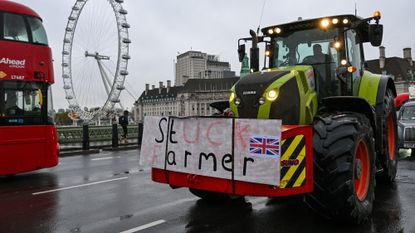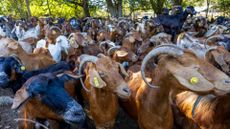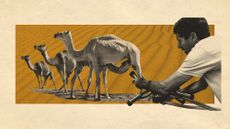Starmer vs the farmers: who will win?
As farmers and rural groups descend on Westminster to protest at tax changes, parallels have been drawn with the miners' strike 40 years ago

Thousands of farmers have descended on Westminster today to protest at changes to agricultural inheritance tax set out in last month's budget which have been branded a "betrayal" by union leaders.
Among the changes is a tax of 20% to be introduced on inherited farming assets above £1 million. Farming groups warn this will have a "catastrophic" impact on family farms and have threatened to go on strike and blockade ports unless there is a change of course.
"It's not exactly the fuel protests that paralysed Britain under Tony Blair (yet)," said Politico's London Playbook. "But it's still quite a moment."
Subscribe to The Week
Escape your echo chamber. Get the facts behind the news, plus analysis from multiple perspectives.

Sign up for The Week's Free Newsletters
From our morning news briefing to a weekly Good News Newsletter, get the best of The Week delivered directly to your inbox.
From our morning news briefing to a weekly Good News Newsletter, get the best of The Week delivered directly to your inbox.
What did the commentators say?
Parallels are already being drawn between Labour's growing stand-off with farmers and the miners' strike 40 years ago. Last week, Keir Starmer was forced to distance himself from comments by former Tony Blair adviser John McTernan, who said Britain "doesn't need small farmers", and that he was in favour of doing to farmers "what Margaret Thatcher did to the miners".
That is the "existential fear" that is driving thousands of farmers to London this week, said Will Lloyd in The Times, that "farmers are to the 2020s what miners were to the 1980s. The unfortunate casualties of progress, punished and then abandoned by the state."
It's "easy to sympathise with their concerns at what they see as an assault on family farms," when British agriculture is "already struggling to cope with the effects of Brexit, Covid and the relentlessly tight margins imposed by supermarket pricing", said Donald Macintyre on the i news site. But while farmers are "furious" with Rachel Reeves, her policy is still the "right one".
Labour have argued that only a quarter of the largest landowning farmers will be affected by the tax changes. In an article for The Telegraph, Steve Reed, secretary of state for the Department for Environment, Food & Rural Affairs, accused the Tories of making "false claims" about their impact. Indeed, in the immediate aftermath of the Budget, Paul Johnson, director of the Institute for Fiscal Studies, told Sky News farmers will "still be better treated than anyone else in terms of inheritance tax".
Far from representing a "new communist dictatorship", argued Will Hutton in The Guardian, the changes will actually drive down inflated land prices and enable priced-out young agriculturalists to start their own farms. "New life and ideas will be brought to the rural economy as innovative, energetic farmers enter the market", he said, reinvigorating life in Britain's countryside.
What next?
Labour has more rural MPs – 145 – than any other party, but though the party would never admit it, of all the special interest groups to take on, farmers are one of the "most politically feeble", said The Economist. The National Farmers' Union may have called for "militant protest" but "when it comes to imposing their will on governments, British farmers have little practice" or "political nous", said the magazine.
The closure of the coal mines brought "social devastation" and made Britain "pathetically dependent" on international energy suppliers, said Lloyd, and now the government "seems keen to repeat this process with food". "As the world turns inwards and tariff walls begin to bisect continents, it's an interesting risk to take. It's a hard thing being cold. Being hungry is another."
Sign up for Today's Best Articles in your inbox
A free daily email with the biggest news stories of the day – and the best features from TheWeek.com
-
 The far-right conspiracy conduit who will be Trump's information gatekeeper
The far-right conspiracy conduit who will be Trump's information gatekeeperIn the Spotlight How Natalie Harp rose from obscurity to trusted Trump aide
By David Faris Published
-
 'Vance stands at a crossroads'
'Vance stands at a crossroads'Instant Opinion Opinion, comment and editorials of the day
By Justin Klawans, The Week US Published
-
 Taylor Swift wraps up record-shattering Eras tour
Taylor Swift wraps up record-shattering Eras tourSpeed Read The pop star finally ended her long-running tour in Vancouver, Canada
By Peter Weber, The Week US Published
-
 What are Trump's plans for the climate?
What are Trump's plans for the climate?Today's big question Trump's America may be a lot less green
By Devika Rao, The Week US Published
-
 Is Cop29 a 'waste of time'?
Is Cop29 a 'waste of time'?Today's Big Question World leaders stay away as spectre of Donald Trump haunts flagship UN climate summit
By The Week UK Published
-
 How 'corn sweat' has made summer in the Midwest worse
How 'corn sweat' has made summer in the Midwest worseUnder The Radar Lend an ear to this kernel of agricultural science.
By Rafi Schwartz, The Week US Published
-
 Greece's deadly 'goat plague' threatens its trademark feta cheese
Greece's deadly 'goat plague' threatens its trademark feta cheeseUnder the Radar About 9,000 animals have already been culled amid outbreak of 'highly contagious' PPR virus
By Harriet Marsden, The Week UK Published
-
 Why is Mexico City running out of water?
Why is Mexico City running out of water?Today's Big Question Climate change and bad planning bring on 'Day Zero'
By Joel Mathis, The Week US Published
-
 The growing thirst for camel milk
The growing thirst for camel milkUnder the radar Climate change and health-conscious consumers are pushing demand for nutrient-rich product – and the growth of industrialised farming
By Harriet Marsden, The Week UK Published
-
 Why curbing methane emissions is tricky in fight against climate change
Why curbing methane emissions is tricky in fight against climate changeThe Explainer Tackling the second most significant contributor to global warming could have an immediate impact
By Richard Windsor, The Week UK Published
-
 How the EU undermines its climate goals with animal farming subsidies
How the EU undermines its climate goals with animal farming subsidiesUnder the radar Bloc's agricultural policy incentivises carbon-intensive animal farming over growing crops, despite aims to be carbon-neutral
By Harriet Marsden, The Week UK Published